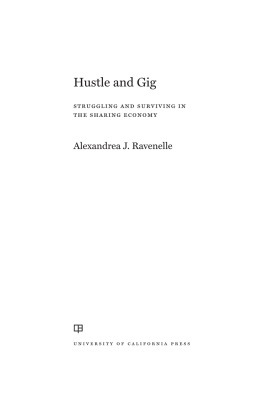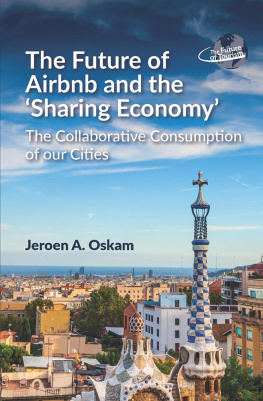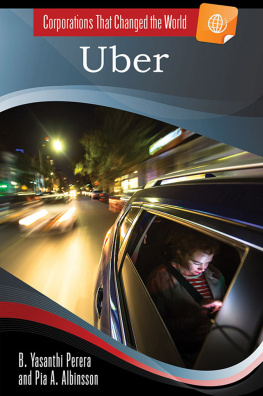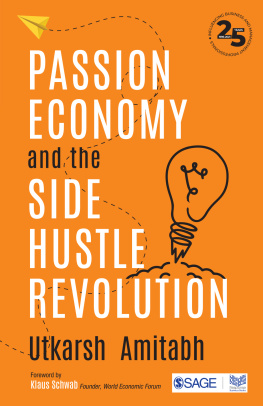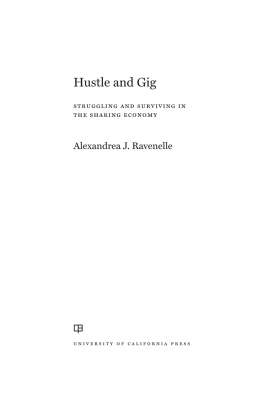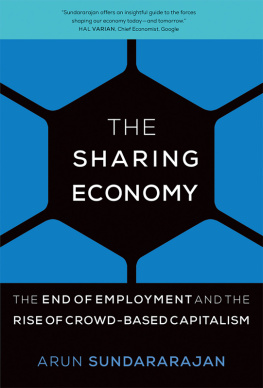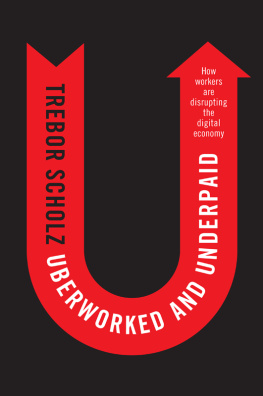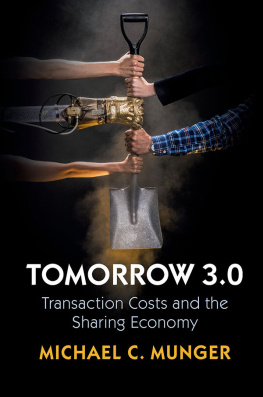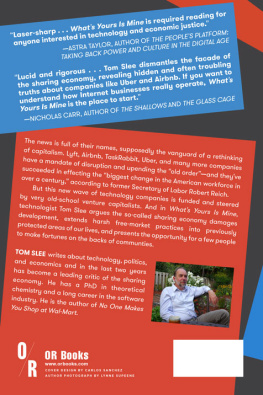Acknowledgments
First and foremost, I owe a debt of gratitude to the workers who took time out of their daysin lives where time truly is moneyto talk to me about the experience of working in the gig economy. Without their honesty and openness, this would have been a very different project.
I started my career in journalism and nonprofits, and my journey to researching the sharing economy was a multistep process with numerous mentors, colleagues, and loved ones providing support and advice along the way.
I finished this manuscript while working as a visiting instructor at Mercy College in New York, where Karol Dean, Diana Juettner, and Dorothy Balancio offered their tireless encouragement and support. My students and colleagues at Mercy have been especially gracious and eager to help, regularly forwarding me articles about the gig economy and inquiring about the status of my research.
My editor, Naomi Schneider, showed early interest in this project, when it was just a one-page proposal, and has provided valuable feedback and advocacy. Her editorial assistant, Benjy Malings, has been exceptionally patient with the numerous questions associated with a first-time author. The production teamJessica Moll and Bonita Hurdhave been the epitome of patience. Thank you to P.J. Heim for building the index.
As a graduate student at the University of Missouri, I was assigned Barbara Katz Rothmans essay Now You Can Choose! Issues in Parenting and Procreation in one of my classes. Amid my orange highlights, I scrawled good writer in the margins, with a notation to revisit how she brought stories into her argument. A decade later, I found myself in Barbaras food studies course at the City University of New York Graduate Center and eventually became her advisee in matters both academic and personal. I consider myself exceptionally lucky to have connected with such a talented and thoughtful writer and mentor.
Philip Kasinitz, the executive officer of the Graduate Center sociology program during most of my tenure, was also generous with his time, humoring my occasional office drop-ins with hour-long conversations on everything from article topics to job applicationseven making time to meet with me while traveling internationally. Paul Attewell provided additional advice on theory and writing, and Vilna Bashi Treitler provided me with a crash course in matrix interviewing, courtesy of Learning from Strangers , that made it possible for me to collect these stories.
John Torpey and Samson Frankel took a chance on my academic aspirations when these aspirations amounted to little more than optimism. John was especially gracious with his time, reading funding proposals and providing the feedback and reassurance that I so desperately needed at times, while Samsons encouragement was a decisive step in my return to graduate school.
Juliet Schor shared her transcription resources and offered professional guidance early in my academic career, serving as a crucial resource and a welcome addition as a mentor. Wayne Brekhus, in his first semesters as an assistant professor, showed me how to bring research into the classroom and inspired my own categorization of workers. I owe a debt of gratitude to Jennifer Silva and Tamara Mose for their valuable suggestions for strengthening the manuscript, and to David Brady for skilled mentoring.
I have also benefited greatly from mentoring by former Graduate Center colleagues. Jonathan Davis and Alexandre Frenette provided feedback and advice on proposal and article writing and generously shared their own work, while fellow cohort members Sarah DAndrea and Rachel Bogan were a source of equally important commiseration.
While at the CUNY Graduate Center, my work was supported by an Ewing Marion Kauffman Foundation Dissertation Fellowship in Entre-preneurship, an Early Research Initiative Award in Interdisciplinary Research in the Service of Public Knowledge, a Dissertation Year Award, and a Doctoral Student Research Grant. I remain grateful to the Kauffman Foundation for providing ongoing support and networking opportunities, and to the Graduate Centers sociology department, including Rati Kashyap and Lynn Chancer, for their backing.
Research can be myopia inducing, and I thank the family and friends who have provided support, reassurance, and encouragement. Dena Kessler, Joel Rosner, Digs Majumder, Isaiah Akin, Chani Kavka, Jonathan Weinberg, and Jamie Moore served as sounding boards and offered invaluable friendship. Brian Kennedy and Alex Palmer, members of my writing group, were a source of competitive encouragement.
My mother was an early advocate of my writing career, battling rush-hour traffic to bring me to newspaper meetings and supporting my entrepreneurial efforts. My aunt Diane Lefebvre challenged me to publish my work and has never stopped believing in me. Both Diane and my mother-in-law, Eva Duncan, gave the ultimate gift of their time, generously cooking meals, helping with childcare, and offering their support and understanding when I was overwhelmed with deadlines. My brother Chuck shared his own experiences in the gig economy world and was an upbeat cheerleader.
My husband, Sam Duncan, kept me fed, the dog walked, and the baby sleeping, and prevented the ever-present dishes on my desk from turning into a moldy avalanche. I love you and appreciate all that you do. Thank you.
This book is dedicated to Anna Addison, who inspired me to write multiple chapters in a summer and was the perfect dissertation baby, happy to watch me write and even happier to play with my discarded drafts. May you always achieve your dreams.

